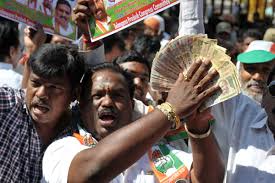KOLKATA, (MILLAT+APP/AFP) – Tens of thousands of people joined nationwide protests Monday against India’s ban on high-value banknotes, which organisers say has caused a “financial emergency” in a country
that operates almost entirely on cash.
India is still reeling from Prime Minister Narendra Modi’s shock decision nearly three weeks ago to pull 86 percent of the currency from circulation overnight, triggering a chronic shortage of cash.
Many ordinary Indians say they support the scheme if it forces
the rich to pay their taxes by making them bank undeclared income, but economists have warned it could hit growth hard.
Around 25,000 people took to the streets of the eastern city of Kolkata, capital of West Bengal state, whose left-wing Chief Minister
Mamata Banerjee has warned of “riots and epidemics” if the ban continues.
Protester Sumit Sen said he had been forced to close his grocery
shop after business slowed to a trickle.
“Running my grocery shop became impossible,” the 45-year-old told AFP, urging the government to reverse the move.
An estimated 6,000 rallied in Mumbai, India’s western commercial
hub, police said.
“We are protesting against the undeclared financial emergency
imposed by the government and the hardships people across the country
are facing because of this illegal decision,” said Manish Tiwari of the opposition Congress party.
“The decision to demonetise high-value currency was done without
any authority and legislation and is clearly illegal.”
Owners of the banned 500 and 1,000 rupee ($7.30, $14.60) notes
have until the end of the year to deposit them in a bank, and can only directly exchange a small number for new currency.
But authorities have struggled to print enough new notes to meet demand and economists say the ensuing cash crunch will hit growth.
Former prime minister Manmohan Singh, a respected economist, said last week it would shave at least two percentage points off growth, which topped seven percent in the first half of the financial year.
“I do not disagree with the objectives but it is a monumental case
of mismanagement,” the Congress party lawmaker told parliament.
“The way demonetisation has been implemented, it will hurt agricultural growth and all those people working in the informal sector.”
Over 90 percent of transactions in India are conducted in cash and many of the country’s poorest have no access to banking.
Many have been left without enough cash to buy food or daily essentials, while farmers have been unable to buy seeds and small traders say business has fallen off a cliff.
Nonetheless Modi has repeatedly defended the scheme, accusing its
detractors of being tax evaders and urging all Indians to switch to
non-cash payment methods.
On Monday the government proposed introducing a penalty of 85
percent for anyone caught with undeclared money, but said it would charge anyone who comes forward voluntarily a lower rate of 50 percent.
Parliament has yet to approve the proposal, which is contained in an
amendment to the existing tax laws.
International News
Tens of thousands protest against India cash ban
